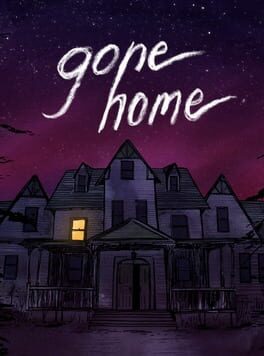This review contains spoilers
"No Sam you don't understand, killing children in the middle east is actually progressive if the soldier who kills them is homosexual"- Lonnie, probably.
Gone home suffers two problems, both of which can probably be atributted to being one of the first games in the indie boom of the 2010's.
The first is that notes as your main narrative device was already pretty overused in the 2013, nevermind today (and its not that im bothered by reading, I love reading in videogames, but only if what I'm reading is well written), but i would be willing to forgive the game for this if what the story , or at least its themes, were interesting or complex.
And this is the second problem of Gone Home, when it came out (heh), queer narratives in videogames were still in its infancy, so I suppose you could actually be surprised by the most basic possible iteration of "two teenagers of the same gender who don't fit in fall in love, the parents of one of them don't approve so they both flee together", but nowadays not only is this bland, but you can kind of see it didn't have any thought put behind its queer narative aspirations beyond young homosexual love.
Don't get me wrong, there is nothing wrong with that kind of story, but when the game tells you explicitly that Lonnie, a lesbian teenager in 1995 who supposedly hates authority, is perfectly fine with offering her soul to the biggest military industrial complex in the world, one which not only finds her repulsive on an ideological and personal level, but will command her to exert unbelievable violence to poor and oppresed people, some of whom might also be queer, AND THEN the game pretty much glosses over it and says the only reason she didn't enlist in the end is because she loves Sam too much makes me think the only reason they made her want to be a soldier is because it's probably the least """""traditionally feminine""""" job aspiration without much more thought behind.
Gone home suffers two problems, both of which can probably be atributted to being one of the first games in the indie boom of the 2010's.
The first is that notes as your main narrative device was already pretty overused in the 2013, nevermind today (and its not that im bothered by reading, I love reading in videogames, but only if what I'm reading is well written), but i would be willing to forgive the game for this if what the story , or at least its themes, were interesting or complex.
And this is the second problem of Gone Home, when it came out (heh), queer narratives in videogames were still in its infancy, so I suppose you could actually be surprised by the most basic possible iteration of "two teenagers of the same gender who don't fit in fall in love, the parents of one of them don't approve so they both flee together", but nowadays not only is this bland, but you can kind of see it didn't have any thought put behind its queer narative aspirations beyond young homosexual love.
Don't get me wrong, there is nothing wrong with that kind of story, but when the game tells you explicitly that Lonnie, a lesbian teenager in 1995 who supposedly hates authority, is perfectly fine with offering her soul to the biggest military industrial complex in the world, one which not only finds her repulsive on an ideological and personal level, but will command her to exert unbelievable violence to poor and oppresed people, some of whom might also be queer, AND THEN the game pretty much glosses over it and says the only reason she didn't enlist in the end is because she loves Sam too much makes me think the only reason they made her want to be a soldier is because it's probably the least """""traditionally feminine""""" job aspiration without much more thought behind.
